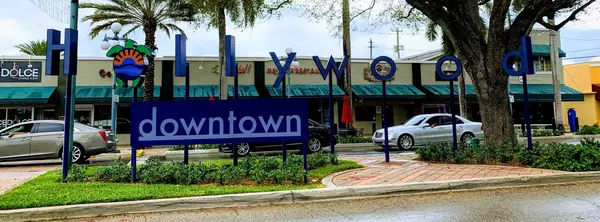Living in Broward: Pembroke Pines
Pembroke Pines, a Suburban Gem in Broward CountyNestled in Broward County, Pembroke Pines is a charming suburb of Fort Lauderdale, boasting a population of 170,346 residents. This vibrant city offers a high quality of life, excellent schools, and a strong sense of community, making it an ideal place to call home for families, professionals, and retirees alike.As a buyer in Pembroke Pines, you'll find a wide range of real estate options to suit your needs. From spacious single-family homes in family-friendly neighborhoods to modern condos and townhouses with convenient amenities, there is something for everyone. The real estate market in Pembroke Pines is diverse, with properties that cater to different budgets and preferences.One of the greatest advantages of living in Pembroke Pines is its proximity to some of the top cities in South Florida. Fort Lauderdale, just a short drive away, offers an array of entertainment options, including world-class dining, shopping, and cultural events. Miami, with its vibrant nightlife and international appeal, is also easily accessible. Living in Pembroke Pines allows you to enjoy the best of both worlds – the tranquility of suburban living and the excitement of nearby urban centers.When it comes to neighborhoods, Pembroke Pines has plenty to offer. SilverLakes, for example, is a highly sought-after community known for its pristine lakes, lush landscapes, and well-maintained parks. It is a haven for outdoor enthusiasts and families who enjoy spending time in nature. Pembroke Falls, on the other hand, is a gated community featuring elegant homes, resort-style amenities, and a tight-knit community atmosphere. This neighborhood is perfect for those seeking a secure and luxurious lifestyle.Residents of Pembroke Pines also benefit from a wide range of recreational activities. The city maintains numerous parks, golf courses, and sports facilities, providing ample opportunities for outdoor fun and fitness. The Pembroke Lakes Mall offers a premier shopping experience, while the Pembroke Pines Charter School System ensures that families have access to top-notch education.In conclusion, Pembroke Pines is a hidden gem within Broward County. Its exceptional quality of life, diverse real estate options, and close proximity to top cities make it an attractive destination for buyers looking to settle down in South Florida. Whether you're seeking a peaceful suburban retreat or a vibrant community with easy access to urban amenities, Pembroke Pines has it all.
Living in Broward: Fort Lauderdale
Living in Broward: Fort LauderdaleFort Lauderdale is a vibrant and bustling city located in Broward County, Florida. Known for its beautiful beaches and exciting nightlife, Fort Lauderdale is a popular destination for both tourists and homebuyers. If you're considering making this sunny city your home, here are a few things you should know.Fort Lauderdale is where the action is. With its year-round warm weather and an abundance of recreational activities, this city offers a truly active lifestyle. Whether you enjoy water sports, golfing, or simply lounging on the beach, Fort Lauderdale has it all. The city also hosts numerous events and festivals throughout the year, attracting visitors from all over the world. One of the most famous events is spring break, where college students flock to the city to enjoy the vibrant party scene.Aside from its lively atmosphere, Fort Lauderdale is also known for its convenient transportation options. The city is home to the Fort Lauderdale-Hollywood International Airport, which offers flights to various domestic and international destinations. This makes it incredibly easy for residents to travel to and from the city, whether it's for business or leisure.When it comes to choosing a neighborhood in Fort Lauderdale, you'll find a wide range of options to suit your preferences. Some of the top cities in the area include Wilton Manors, Coral Ridge, and Victoria Park. These neighborhoods offer a mix of beautiful homes, lush landscapes, and access to amenities such as shopping centers, restaurants, and parks. Whether you're looking for a beachfront property or a cozy suburban home, Fort Lauderdale has something for everyone.In terms of real estate, Fort Lauderdale offers a diverse housing market, catering to both buyers and renters. From luxurious waterfront estates to affordable condos, there is a wide range of options to suit various budgets and lifestyles. Whether you're a young professional looking for a trendy downtown apartment or a family in search of a spacious single-family home, Fort Lauderdale has plenty to offer.Living in Fort Lauderdale means enjoying a vibrant and active lifestyle, with access to beautiful beaches, exciting events, and convenient transportation options. Whether you're a buyer or a renter, the city's diverse real estate market ensures there is something for every taste and budget. So, why wait? Start exploring the possibilities and make Fort Lauderdale your new home.
Living In Broward: Hollywood
Hollywood, Florida is a hidden gem nestled between the bustling cities of Miami and Fort Lauderdale. With its prime location, Hollywood offers residents the best of both worlds - the tranquility of a suburban lifestyle and the excitement of a metropolitan area. If you're considering buying a home in Hollywood, here are the top 10 neighborhoods to consider:
1. Hollywood Lakes: Known for its beautiful waterfront properties, Hollywood Lakes offers a mix of charming historic homes and modern luxury estates. Residents here enjoy stunning views of the Intracoastal Waterway and have easy access to the pristine Hollywood Beach.
2. Emerald Hills: This upscale neighborhood is a haven for families, boasting top-rated schools and a strong sense of community. With its tree-lined streets and spacious homes, Emerald Hills provides a tranquil retreat for those seeking a peaceful suburban life.
3. Hollywood Hills: Nestled between the Everglades and the Atlantic Ocean, Hollywood Hills offers a diverse range of housing options. From cozy bungalows to sprawling Mediterranean-style villas, this neighborhood has something for everyone.
4. Harbor Islands: Situated on a group of picturesque islands, Harbor Islands is a gated community that ensures privacy and security for its residents. The community features luxurious amenities such as a marina, tennis courts, and a fitness center.
5. Downtown Hollywood: For those seeking an urban lifestyle, Downtown Hollywood is the place to be. This vibrant neighborhood is filled with trendy restaurants, art galleries, and boutique shops. In recent years, it has experienced a revitalization, making it a sought-after destination for young professionals and creatives.
6. Hollywood Beach: With its pristine white sand and crystal-clear waters, Hollywood Beach is a paradise for beach lovers. Living in this neighborhood means having direct access to a two-mile-long boardwalk, lined with cafes, shops, and entertainment options.
7. Oakridge: Situated on the western edge of Hollywood, Oakridge is a peaceful community known for its spacious single-family homes and tree-filled streets. It offers a suburban lifestyle while still being conveniently located near major highways and shopping centers.
8. Hillcrest: Known for its affordable housing options, Hillcrest is a diverse neighborhood that appeals to first-time homebuyers and retirees alike. Residents enjoy easy access to parks, golf courses, and the vibrant Hollywood downtown area.
9. Parkside: Offering a mix of single-family homes and townhouses, Parkside is a neighborhood characterized by its well-kept properties and family-friendly atmosphere. Its central location allows for easy commuting to both Miami and Fort Lauderdale.
10. Hollywood Golf Estates: Golf enthusiasts will find their paradise in Hollywood Golf Estates. This neighborhood is home to the prestigious Hollywood Beach Golf Resort, featuring an 18-hole championship course and stunning views of the Atlantic Ocean.
Hollywood, Florida truly has something for everyone. Whether you prefer a waterfront property, a suburban oasis, or an urban lifestyle, you'll find it here. With its close proximity to both Miami and Fort Lauderdale, Hollywood offers the perfect blend of convenience and tranquility. Start exploring these top neighborhoods today and find your dream home in the heart of Hollywood.
The Home Buying Process Demystified: A Step-by-Ste
The Home Buying Process Demystified: A Step-by-Step Guide for First-Time BuyersBuying a home is an exciting milestone for anyone, especially for first-time buyers. However, navigating the home buying process can often seem intimidating and overwhelming. That's why we have broken it down into manageable steps to help you understand what to expect.Step 1: Assess Your FinancesBefore diving into the home buying process, it's crucial to assess your financial situation. Determine how much you can afford by calculating your monthly income, expenses, and any outstanding debts. This will give you a clear idea of your budget and help you avoid any financial strain.Step 2: Get Pre-Approved for a MortgageOnce you have an idea of your budget, it's time to get pre-approved for a mortgage. This step involves meeting with a lender who will assess your financial information and determine how much you can borrow. Pre-approval will give you a head start when making an offer on your dream home.Step 3: Find a Real Estate AgentA reliable real estate agent can make all the difference in your home buying journey. They have the experience, knowledge, and connections to find properties that meet your criteria. Make sure to choose an agent who understands your preferences and can guide you through the process.Step 4: Start House HuntingWith the help of your real estate agent, begin the exciting process of house hunting. Make a list of your must-haves and nice-to-haves, keeping in mind your budget and personal preferences. Visit open houses, schedule showings, and don't be afraid to ask questions about the properties you're interested in.Step 5: Make an Offer and NegotiateOnce you've found the perfect home, it's time to make an offer. Your real estate agent will help you determine a fair price based on market value. Be prepared for negotiations with the seller, as they may counter your offer. Your agent will guide you through the negotiation process to ensure a successful outcome.Step 6: Home Inspection and AppraisalAfter the offer is accepted, it's crucial to have a professional home inspection to identify any potential issues with the property. Additionally, the lender will require an appraisal to confirm the property's value. These steps protect your investment and ensure you're aware of any necessary repairs or adjustments.Step 7: Closing the DealThe final step is closing the deal. This involves signing all the necessary paperwork, including the mortgage agreement and transfer of ownership. Your real estate agent and a closing attorney will guide you through this process, ensuring all legal and financial aspects are handled correctly.By breaking down the home buying process into these manageable steps, we hope to demystify the journey for first-time buyers. Remember, having a knowledgeable real estate agent by your side is the key to a successful and smooth home buying experience. So take a deep breath, follow these steps, and soon you'll be unlocking the door to your dream home.
Credit and Home Buying
For potential home buyers, understanding the role of credit is crucial in the home buying process. Your credit score plays a significant role in determining whether you qualify for a mortgage and the interest rate you'll be offered. If you're considering buying a home in the near future, it's essential to pay attention to your credit and take steps to improve it if necessary.Raising your credit score should be a priority before embarking on the home buying journey. A higher credit score not only increases your chances of getting approved for a mortgage but also allows you to secure more favorable loan terms. To boost your credit score, start by paying your bills on time and in full. Late payments can have a detrimental effect on your credit score, so make it a habit to pay your bills promptly. Additionally, reducing your credit card balances and keeping your credit utilization low can also positively impact your credit score.Understanding the importance of credit score in the home buying process is essential. Lenders use your credit score to assess your creditworthiness and determine the level of risk they face when lending you money. A higher credit score indicates that you are a responsible borrower and are more likely to make timely mortgage payments. This often leads to lower interest rates and more favorable loan terms, saving you money over the life of your loan.While raising your credit score is important, it's equally important to avoid certain actions that could negatively affect your credit when buying a home. One common mistake is opening new lines of credit or making significant purchases before or during the home buying process. These actions can increase your credit utilization and potentially lower your credit score, making it harder to secure a mortgage or obtain a favorable interest rate.In conclusion, your credit score plays a vital role in the home buying process. Take the necessary steps to improve your credit score before applying for a mortgage, and be mindful of your financial decisions during the home buying process. By understanding the importance of credit and avoiding detrimental actions, you'll increase your chances of securing a mortgage with favorable terms and ultimately achieving your dream of homeownership.
Due Diligence When Buying a Home
Purchasing a home is an exciting and important decision, but it's crucial to exercise due diligence throughout the process. From conducting inspections to appraising the property, there are several essential steps that buyers should take before finalizing the purchase. In this blog post, we will delve into the significance of due diligence and provide an overview of the necessary procedures.The first step in due diligence when buying a home is conducting a thorough inspection. This involves hiring a professional inspector to evaluate the property's condition, including its structural integrity, electrical systems, plumbing, and more. By uncovering any underlying issues, buyers can make informed decisions and negotiate repairs or adjust their offer accordingly.Once the inspection is complete, it is important to review the inspector's findings carefully. If any major concerns arise, it might be necessary to seek further specialized assessments or consult with contractors for estimates and opinions. This additional due diligence ensures that buyers have a comprehensive understanding of the property's condition and the potential costs associated with necessary repairs or renovations.Another critical aspect of due diligence is obtaining an appraisal. A professional appraiser will assess the property's market value by considering factors such as location, size, condition, and recent comparable sales. An accurate appraisal is vital as it determines the maximum amount that lenders are willing to finance, preventing buyers from overpaying for a property.In addition to inspections and appraisals, buyers should also conduct research on the neighborhood and the property's legal history. This includes investigating the local amenities, schools, crime rates, and future development plans. It is also essential to review the title history to ensure there are no liens, encumbrances, or other legal issues associated with the property.Overall, due diligence is a crucial process that empowers buyers to make informed decisions when purchasing a home. By conducting thorough inspections, obtaining accurate appraisals, and researching the property's legal history, buyers can mitigate risks and avoid potential problems. Remember, the time and effort invested in due diligence can save buyers from unexpected expenses and provide peace of mind in their new home.In conclusion, when it comes to buying a home, due diligence is an indispensable step. By following the necessary procedures such as inspections, appraisals, and researching the property's history, buyers can make informed decisions and safeguard their investment. So, be diligent, take your time, and ensure you have all the essential information before finalizing your dream home purchase.
Buying vs Renting
When it comes to housing, one of the biggest debates is whether it's better to buy or rent. Both options have their advantages and disadvantages, but even with higher interest rates, buying often comes out on top.Let's start by looking at the perspective of buyers. One of the main benefits of buying a home is the sense of ownership and stability it provides. When you buy a property, it becomes yours, and you have the freedom to make any modifications or improvements you desire. This level of control over your living space is something that renters simply can't experience. Additionally, as a homeowner, you have the opportunity to build equity over time. Paying a mortgage allows you to gradually increase your stake in the property, which can ultimately lead to financial security in the long run.On the other hand, renters also have their reasons for choosing not to buy. Renting offers flexibility and less financial commitment. For those who are unsure about their long-term plans or prefer the freedom of moving around, renting can be a more suitable option. Renters are also not responsible for maintenance and repair costs, which can be a significant advantage. However, it's important to note that while renting may seem cheaper in the short term, the long-term financial benefits of buying often outweigh the initial savings.Even with higher interest rates, it is still generally better to buy a home versus renting. Historically, interest rates have been much higher than they are today, and people have still managed to successfully buy and own properties. Higher interest rates may increase monthly mortgage payments, but they can also be a driving force for potential buyers to act sooner rather than later. Furthermore, interest rates are not fixed for the entire loan term; they can be refinanced when rates go down, offering homeowners the opportunity to save money in the future.In conclusion, while there are advantages to both buying and renting, buying often proves to be the better long-term investment. Even with higher interest rates, the benefits of homeownership, such as stability, equity building, and the freedom to make the space truly your own, outweigh the advantages of renting. Of course, every individual's circumstances are unique, and it's essential to consider factors such as location, financial situation, and personal preferences before making a decision. Ultimately, buying a home is not just an investment in property but also an investment in your future.
Flood Insurance for Condos
Living in a high-rise condominium can be an exciting and convenient lifestyle choice. With amenities, security, and a prime location, it's no wonder why many people opt for condo living. However, when it comes to protecting your investment, it's crucial to consider the need for flood insurance.Flood insurance is a specialized type of coverage that protects your property and belongings from damage caused by floods. Typically, it is not included in a standard homeowners insurance policy. While some may assume that living in a high-rise eliminates the need for flood insurance, that is not always the case.High-rise condos, just like any other type of property, are not immune to the risk of flooding. A severe storm, a burst pipe, or even a malfunctioning sprinkler system can result in significant water damage. In fact, the higher you live in a high-rise, the more susceptible you may be to water damage caused by flooding.One important factor to consider is the location of your condominium. If you live in an area prone to heavy rainfall, coastal storms, or near a body of water, the risk of flooding increases. Even if you are located on a higher floor, water can still seep in through windows, balconies, or common areas.Furthermore, the Homeowners Association (HOA) responsible for managing the condominium complex may require flood insurance as part of the association's master insurance policy. This coverage helps protect the entire building and the common areas, but it may not extend to individual units. It is essential to review the HOA's insurance policy to understand what is covered and what is not.Having your own flood insurance policy ensures that you have adequate coverage for your personal belongings, improvements made to your unit, and any damage caused by flooding. It provides peace of mind knowing that you won't be left with the financial burden of repairing and replacing your possessions in the event of a flood.In conclusion, being a condo owner doesn't exempt you from the need for flood insurance. Flooding can occur in any property, including high-rise condos. As a responsible homeowner, it is crucial to assess the risk factors, review your HOA's insurance policy, and obtain proper flood insurance coverage to safeguard your investment. Don't wait until it's too late – protect your condo today!

Julio Gonzalez
Phone:+1(754) 274-0680









